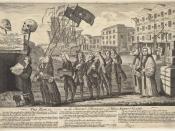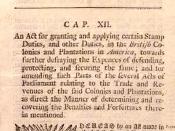Toward Independence
The end of The Seven Years' War in 1763 marked the start of the imperial crisis of the 1760s between the British and Americans. the war also known as the French and Indian war began in 1754 over contested land in the Ohio Valley, variously claimed by Virginians, Pennsylvanians, the French, and the Indians already living there (Roark 130). French traders had cultivated alliances with the Indian tribes in Ohio County, a frontier region they regarded as New France.
The war in North America officially ended with the signing of the Treaty of Paris on February 10, 1763. The British offered France a choice of either its North American possessions east of the Mississippi or the Caribbean islands of Guadeloupe and Martinique, which had been occupied by the British. France chose to surrender Canada, and was able to negotiate the retention of Saint Pierre and Miquelon, two small islands in the Gulf of St.
Lawrence, and fishing rights in the area. The economic value of the Caribbean islands to France was greater than that of Canada because of their rich sugar crops, and they were easier to defend (Wikipedia). With the excitement from the victory of the war, Britain faced another "war" financially. They faced the immense costs of war in money, death, and desire for revenge by losers and winners (130).
Britain sought to recover the huge war debt, by creating a series of acts from the Stamp Act of 1765 to the Coercive Acts of 1774. British ministers believed colonists, as British subjects, should help pay it off. To find revenue, George Grenville founded the Revenue Act of 1764, popularly known as the Sugar Act. This would lower duty on French molasses to three pence, and raised penalties for smuggling (139).The Sugar act was not...


